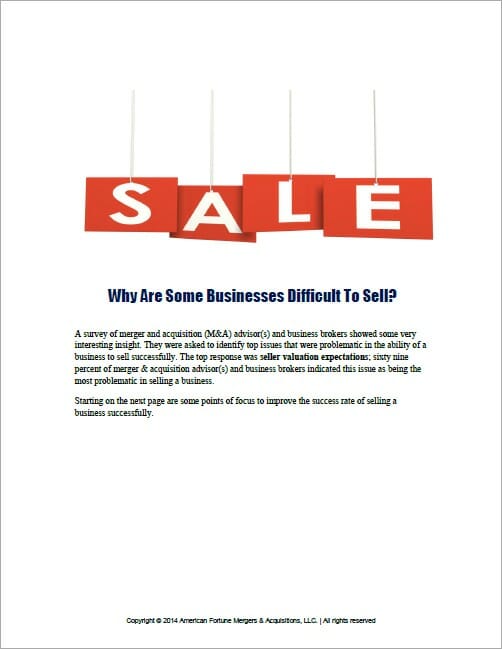Business Exit Strategy Research Paper By MBA Candidates of University of Louisville
We began the project by meeting with the client to find out what research and analysis he would like us to investigate. He told us that one of the main issues he faces is how to convince successful business owners, especially baby boomers, to begin succession planning. Business Exit Strategy & Succession Planning involves getting a business ready to be sold to a new owner, to identify that new owner, and to successfully complete the transition. The client told us that he focuses on matching good, experienced buyers with the right sellers and holding their hand through the transition process; unlike some other companies in the M&A business that are only out to make money.
The client explained that in order to solve the dilemma of convincing more business owners to begin Business Exit Strategy & Succession Planning, he would need to better understand the thought processes that go on in the minds of the business owners. Therefore, he asked us to design a survey regarding this perplexing question from which some helpful insights could be gleaned.
Regarding the business owner survey we conducted, our list of survey candidates was generated from a contact list provided by the client. We built the survey using a survey tool called Kwiksurveys.com, which provides free online surveys and results assessments. To assist with successful delivery of the survey link to the respondents, we used multiple approaches in reaching out to business owners. One method used was the incorporation of a service called Constantcontact.com to help prevent the email messages from being flagged as spam. A second approach was also used by team members who used their .edu addresses operating under the assumption that messages from .edu addresses would be less likely to be marked as spam.
When the respondents answered the survey, Kwiksurveys.com compiled the results and made them available for export via Excel and PDF. We received 120 survey responses in total, but not all 120 responses were complete. Some respondents did not answer all the questions. We also contacted the University of Louisville’s Family Business Center (FBC) to send the survey link to its list of contacts however, due to time constraints the FBC was unable to send out the survey link to its distribution list.
Discussion
Of the participants who responded to our survey for the Business Exit Strategy, 85% decided to own a business because they see it as an income generator and would prefer to reap the entire gains of their efforts rather than sharing the reward. This is consistent with the way most entrepreneurs view their business, which is either a job or a personal mission. Responses to Question 2 on the survey depict that 27% of the total entrepreneurs chose Personal Mission and 28% of the 84 entrepreneurs who responded ranked Job the explanation of how they view their business. A proportion of 12% of total responses were entrepreneurs that defined “Other” as one of their top 5 choices for how they view their business and a recurring theme in these qualitative responses seemed to be passion. In contrast, only 32% respondents to Question 2 saw their business as something they liked to spend their spare time on and as something they have spent a large amount of time and effort growing.
These responses show that generally entrepreneurs have an emotional attachment to their business not because they see it as the result of their efforts, but because they believe they are working for a higher cause. Their business is their way of indulging into what they are passionate about doing. The survey responses to Questions 1, 2, and 3 elicit an unfettered belief in the business owner that they can make their business a success, while also filling a gap in the market. The driving force for these entrepreneurs seems to be their passion for their cause, their competitive spirit, and the potential for monetary compensation for their efforts.
The responses show an intermingling of the soft and hard aspects of owning a business. The prospect of making a lot of money and the desire to achieve satisfaction from the effort put in complement each other. This makes sense if considered in the light of having a job for the sake of making money. To these respondents entrepreneurship feels like having the perfect job, one which provides the gratification of achievement while providing a monetary reward as well.
Business owners deeply enjoy the freedom that comes from being one’s own boss. These individuals prefer to lead the pack themselves rather than taking orders from someone else. Approximately 95% of entrepreneurs that replied to Question 3 indicated that their favorite aspect of being a business owner is having the freedom to make decisions (70%) and being their own boss (23%). Only about 7% of entrepreneurs regard having time flexibility as the most enjoyable side of owning a business and no entrepreneur ranked being in charge of other people as their favorite aspect. The responses to Question 3 on the survey reinforce the soft side of business ownership. Even though entrepreneurs would prefer to lead rather than follow, this is not their primary reason for owning a business. They enjoy entrepreneurship because it allows them to spend their time doing what they are passionate about and reap financial rewards.
Approximately 32% of entrepreneurs specified that the least enjoyable part of being an entrepreneur is variability of income. No doubt owning a business requires taking on a certain level of risk. However, the higher the amount of risk the higher the potential reward. Since 62% of entrepreneurs rate themselves as high risk-takers (Level 4 and 5 on a scale of 1 to 5 with 5 being the highest), we can concluded that they are attracted to business ownership for the potential of high reward.
Although entrepreneurs dislike the unsteady flow of income, they are willing to take on the risk of losses inherent in owning a business. Another issue that deters business owners is the time commitment their companies require. Thirty percent of individuals that responded to the question regarded not having much free time as the biggest headache in business ownership. Since most entrepreneurs view their business as a full time job, they see it as an endeavor that takes up the majority of their time. Furthermore, since very few entrepreneurs view their business as a hobby as mentioned above, they would typically enjoy having more spare time to indulge in leisure activities.
The biggest uncertainty regarding the future of business that entrepreneurs are anxious to resolve involves changes in government regulations. The qualitative responses of the Business Exit Strategy study for Question 5 on the survey allow for the generalization that a large majority of entrepreneurs see government intervention in the market as a nuisance and would prefer either less regulation or fewer changes in regulation.
Many business owners indicated that they are unhappy with the current government and see regulation as meant to hurt their business rather than facilitate it. Tax policies, Obamacare, and other sorts of regulations are substantial deterrents to business owners. They directly relate the actions of the government to the current state of the economy. The past few years have disrupted the trend of economic growth and this disruption has created uncertainty in the direction the economy will take.
The concern for the economy also borders on a microeconomics. In their responses, entrepreneurs indicated that they worry about how twists and turns in the economy will affect the spending patterns and purchasing power of the consumers. Most take a very pessimistic stance on the future of the economy and believe that more accurate predictions of the economy in the next few years would help their business. This pessimism about the state of the economy is directly related to predictions of unsteady flow of income. This is a substantial discouragement because one of the main reasons why entrepreneurs decide to own businesses is the prospect of financial reward.
Another prevalent unknown that business owners would like to resolve, as extrapolated from qualitative responses to Question 5, is having a successor to their business. Entrepreneurs are unsure about whether the right person, if any, will take over the reins to their business when they step down as leaders. This shows that entrepreneurs do have interest in Business Exit Strategy & Succession Planning and have spent time thinking about it, but are unsure about what steps to take. This could either be because they do not have a concrete idea of all the variables that need to be considered in succession planning, or because they lack a sense of direction regarding where they see their business ending up. There are two major reasons why business owners worry about succession; they are worried about the health and sustainability of the business itself and they are worried about whether their customer base will be well served in their absence. Again, this points to the emotional attachment that doing something a person is passionate about elicits.
The respondents were evenly split, 47-yes – 46-no, on whether or not their business would be able to survive without them if an unforeseen issue caused them to retire immediately. Upon reviewing the qualitative responses, a little less than half of the respondents have either considered succession planning or already have a plan in place and many are still not confident the business could move forward without them. A lot of the entrepreneurs felt they or their business were too young to begin considering the idea of Business Exit Strategy planning. They believe selling or transitioning their business to another owner is too far in the future to develop a plan.
Some were interested in the idea of succession planning, but were experiencing troubles locating another entrepreneur to transition the business to. One respondent said, “I didn’t realize that it is time to do that” and another simply said, “don’t care” so some are still unaware of the importance of succession planning. When asked why they might consider beginning the succession planning process 34% of respondents stated because they feel a responsibility to the business to do so. Another 22% felt financial reasons may cause a plan to be developed. Other reasons an entrepreneur would begin the Business Exit Strategy Planning process were family (18%) and lifestyle (17%). In contrast, only 9% of entrepreneurs believe that a need for independence would cause them to start a Business Exit Strategy Planning for the future.
The respondents were asked to rate several selections on a scale of one to five to determine whom they would seek advice from for Business Exit Strategy & Succession Planning. The number of responses for each rating was then multiplied by the rating value and totaled to give a weighted value for each selection. Accountants and Lawyers were the top two responses, garnering 305 and 302 weighted ratings, respectively; 67 out of 79 and 67 out of 81 respondents rating them three to five stars respectively. Others would also consider a financial consultant (241), other business owners (253) or their spouse (238). Very few entrepreneurs believed they could seek guidance or advice from their competitors (128), friends (132) or adult children (158). The advice of a business consultant (226) or estate planner (218) might also be sought.
When asked what comes to mind when they think of Business Exit Strategy & Succession Planning only 9% of respondents thought of relaxation and 10% thought of freedom from their daily work lives. The majority of respondents claimed providing for their families and children (26%) or uncertainty about the future (23%) are what come to mind when thinking of Business Exit Strategy & Succession Planning. Another 18% of respondents were concerned about the Business Exit Strategy & Succession Planning process in general when they were questioned. From earlier qualitative responses it seemed that respondents were unsure what the process contained or whether or not it would even benefit their company.
Respondents were asked to rank certain reasons they would consider transitioning to a new owner. A total of 47 respondents cited medical issues as the number one reason to transition their business. Another 24 cited other family issues as the reason they would begin considering a Business Exit Strategy & Succession Planning if they had not already done so. A slow economy does not really concern many entrepreneurs, as 7 individuals ranked this the number one reason to begin the transition process.
Survey participants were asked why they do not want to consider transitioning their business. The question was open ended and allowed the respondents to be specific to their situation. The main theme to the responses was that they do not want to consider succession planning is the concern they have that the business will continue to run as it currently does. Many of them said the loss of control over the business would keep them from transitioning the business to a new owner. They were also worried the new owner would change the culture or change the way the business operates and that could affect the quality delivered to their clients. Since many of these businesses are family-owned they are uncertain if the history of the company will be maintained going forward.
When the time finally does come to start Business Exit Strategy, 68% of respondents agreed the process should start three to five years prior to the actual transition. An additional 15% thought at least one year is necessary to transition the business. While 9% believed Business Exit Strategy Planning should begin once the search for a new owner has started or been completed. Only 7% of the respondents did not believe their business requires Business Exit Strategy Planning or did not think it is something they should be concerned with at this moment in their business.
We asked the survey participants who they would feel most comfortable selling their business to once the decision has been made to develop a succession plan or actually sell the business. The respondents rated each choice on a scale of one to five and were weighted as before. Entrepreneurs show by far the most confidence in selling to other experienced business owners (332), followed by investors and venture capitalists (231) or even a competitor (241). Very few would feel comfortable selling their business to a friend (137), relative (147), supplier (170) or customer (179).
Much of this comes down to how much owners trust another person to continue growing a business that they have put so much time and effort into building. Experienced business owners and investors would have a history of successfully operating a business to the current owner’s standards. A competitor would understand the market, which would eliminate some of the learning curve inherent in acquiring a new business but the current owner would likely first want to guarantee the culture would be maintained.
For more information on Business Exit Strategy Planning contact American Fortune at 502-244-0480.







